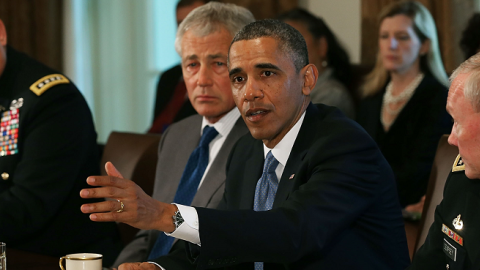In President Obama's "60 Minutes" interview on Sunday, he reiterated his vow not to involve U.S. combat troops in the fight against Islamic State jihadists. He would avoid "the mistake of simply sending U.S. troops back" into Iraq, Mr. Obama said, noting that "there's a difference between them advising and assisting Iraqis who are fighting versus a situation in which we got our Marines and our soldiers out there taking shots and shooting back."
Yet many Americans are skeptical, judging by the new NBC/Wall Street Journal/Annenberg poll showing that 72% of registered voters believe that U.S. troops will eventually be deployed. Perhaps Americans have been listening to some of the president's senior military advisers and several retired senior officers and have decided that their expert opinions sound more realistic.
Chairman of the Joint Chiefs of Staff Gen. Martin Dempsey told the Senate Armed Services Committee on Sept. 16 that if necessary he would recommend that the president order U.S. military advisers to "accompany Iraq troops on attacks" against Islamic State, also known as ISIS. A day later Army Chief of Staff Gen. Ray Odierno said that "you've got to have ground forces that are capable of going in and rooting [ISIS] out." Gen. Odierno did not specify that the ground forces needed to be American, but he said an air campaign alone cannot defeat the jihadists occupying large parts of Iraq and Syria.
Retired senior officers speak with greater candor. James Mattis, the retired Marine general and former commander of the U.S. Central Command, told the House Intelligence Committee on Sept. 18 that it would be a mistake to rule out U.S. ground forces against ISIS. A couple of days earlier, retired Army Gen. Dan McNeill, who commanded coalition forces in Afghanistan, said in a TV interview that ground troops will be needed to defeat ISIS. If the jihadists' threat "is as serious as some people say," the general asked, "then why aren't we applying all elements of American power to it?"
Then there is Gen. Lloyd Austin, who leads Central Command and is thus the senior commander of U.S. forces in the Middle East. Gen. Dempsey told Congress in his Sept. 16 testimony that Gen. Austin recommended committing U.S. special-operations forces to the fight against ISIS. Special-operations forces could reconnoiter and identify targets, assist aircraft that deliver ordnance on targets, kill enemy commanders and, most important, by their very presence stiffen the spine of coalition partners who might agree to send ground forces. President Obama rejected this recommendation.
It is clear that these active and retired senior officers are as doubtful about the U.S.'s ability to achieve its war aims from the air as they are convinced that ground forces—and if necessary, U.S. ground forces—will be needed either to spearhead or assume major responsibility for defeating ISIS.
The political landscape is cleared for a contest between the president's pledge not to use combat troops and the military's professional opinion that defeating the enemy requires the use of well-trained and -equipped and disciplined forces on the ground. The president will win. According to the Constitution he should. There is no question about this.
But what should an officer do who knows from years of training and combat experience that the coalition the president is assembling cannot accomplish its goals without U.S. combat troops? Does the officer swallow his reservations?
Lacking an American ground presence, a U.S. pilot forced to eject by a mechanical failure or ground fire would have to wait hours to be rescued. Do senior U.S. military officers banish the thought of what would happen were ISIS to capture a female American pilot who landed safely after ejecting over enemy-held territory?
ISIS possesses man-portable air-defense systems, or manpads. They can hit planes that provide close air support—for instance, planes flying below 10,000 feet in a pilot-rescue operation. Search-and-rescue is difficult enough when the distance between downed pilot and help is small. When a helicopter must fly hundreds of miles to the rescue—the current situation—the chances of success rapidly diminish.
Will the administration admit a mistake if it realizes that U.S. ground troops are necessary? Or will the White House blame the military for insufficient warning, as the president blamed the intelligence community on "60 Minutes" for insufficient warning about ISIS? Senior officers face the possibility of being blamed for not having recommended what they in fact have.
President Obama may not like it, but those who spoke after 9/11 about a "long war" against Islamic jihadists got it right. The killing of Osama bin Laden ended neither al Qaeda nor its metastasizing into other terrorist groups. The terrorists will not emerge into formations on plains where they can be destroyed from the air. Rather, as in Gaza, they will hide in houses, hospitals, workshops and schools in the cities and towns that ISIS occupies. Attacking the enemy from the air is useful, but it won't succeed without ground forces that can take and hold contested positions.
Senior officers must accept their commander in chief's judgment and carry out orders. But they and like-minded advisers have another option: resigning. Not to embarrass the administration or cause a constitutional crisis, but to indicate the gravity of the ISIS threat. Until stopped, ISIS or its collaborators are likely to mount an attack against the U.S. homeland with the aim of equaling or surpassing al Qaeda's 9/11 success. A military commander's resignation, accompanied by a clear and respectful explanation, would prompt a needed debate over U.S. strategy to achieve the president's goal "to degrade and ultimately destroy" ISIS.
Resigning on principle is not a strong tradition in the U.S. military. The so-called Revolt of the Admirals in the late 1940s began with the resignation of Navy Secretary John L. Sullivan following Defense Secretary Louis Johnson's cancellation of the carrier U.S.S. United States. The argument over the carrier was a dispute over budget cuts and the combat roles of the Navy and Air Force. And the naval officers whose careers ended in the wake of Sullivan's principled resignation did not jump. They were pushed. But the Truman administration's defense cuts came with a price that was realized when the president learned that reductions in naval power prevented an effective blockade of North Korea.
Politics is, by human nature and design, complex and messy. It exists in the military no less than in other large organizations. But the stakes are particularly high where the nation's security is at risk—as it now is. Clarity of purpose is essential and where it is lacking—as in how to defeat ISIS—senior military officers can make an important difference with their actions.



















